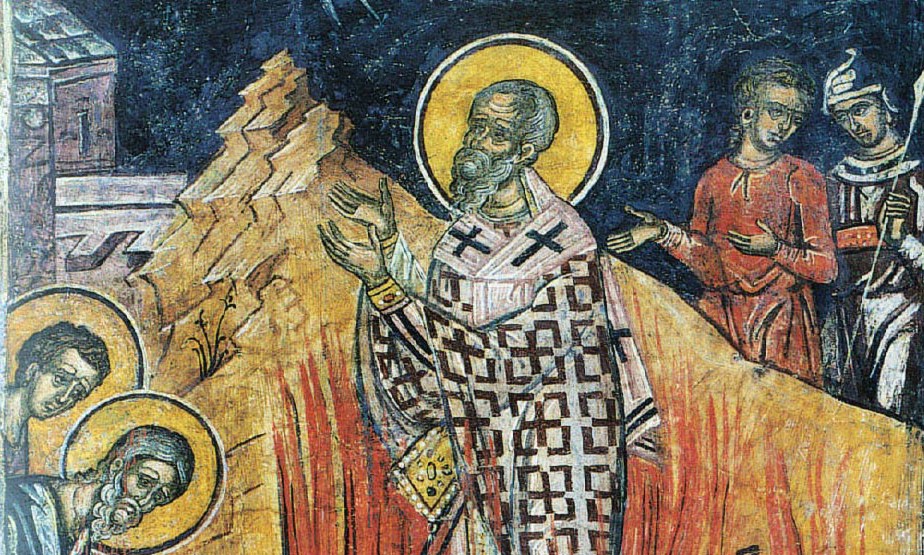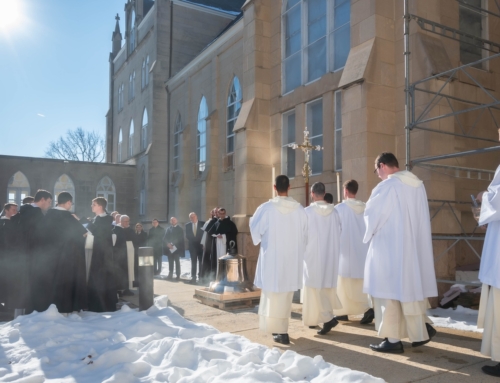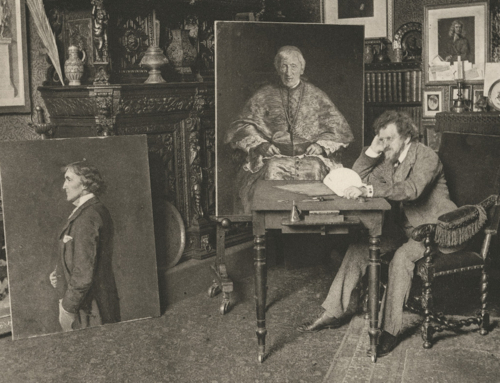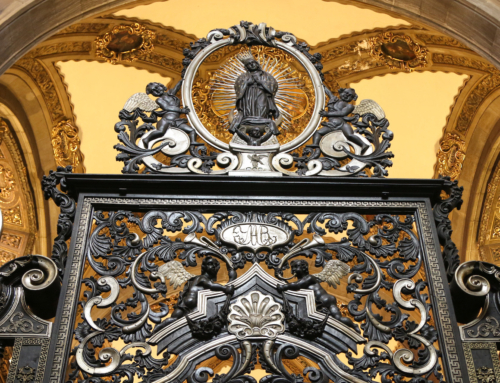In the Nicene Creed we confess belief in “One, Holy, Catholic, and Apostolic Church.” When we say that the Church is Apostolic we affirm not only that the Church was Apostolic in its origins but also that she is Apostolic because she preserves and lives the faith that Jesus entrusted to her through the Apostles and their successors—such as St. Polycarp, bishop of Smyrna, whose memorial we celebrate today.
St. Irenaeus, an early, 2nd-century bishop of Lyons who knew St. Polycarp, explained in Against Heresies that after the martyrdom of the Apostles Peter and Paul, those who had known them continued preaching the Apostolic faith. This included St. Clement, the fourth Bishop of Rome, who lived until the end of the 1st century and “had seen the blessed apostles, and had been conversant with them, [and who] might be said to have the preaching of the apostles still echoing [in his ears], and their traditions before his eyes.” St. Irenaeus lists the succession of Bishops in Rome from St. Peter to Eleutherius, the thirteenth bishop of Rome, showing that the Apostolic faith was lived continuously, passed on
by this succession, [by which] the ecclesiastical tradition from the apostles, and the preaching of the truth, have come down to us. And this is most abundant proof that there is one and the same vivifying faith, which has been preserved in the Church from the apostles until now, and handed down in truth.
In the Eastern part of the Church, the Apostle John lived until the end of the 1st century, and he remained in the living memory of those who had met him, including St. Polycarp, for several more decades. St. Polycarp “was not only taught by the Apostles, and lived in familiar intercourse with many that had seen Christ, but also received his appointment in Asia from the Apostles as Bishop in the Church of Smyrna.” St. Polycarp was grateful for the gift of this saving faith and “always taught the things which he had learned from the apostles, and which the Church has handed down, and which alone are true.” He remembered St. Paul’s exhortation to Timothy, a younger bishop, to “guard what has been entrusted to you. Avoid the godless chatter and contradictions of what is falsely called knowledge, for by professing it some have missed the mark as regards the faith” (1 Tim. 6:20-21). As a faithful shepherd, he worked to rescue those who had strayed from the true faith. “Coming to Rome in the time of Anicetus, [St. Polycarp] caused many to turn away from the aforesaid heretics to the Church of God, proclaiming that he had received this one and sole truth from the apostles—that, namely, which is handed down by the Church.”
As a zealous defender of the true faith, St. Polycarp admonished those who endangered souls by teaching falsehood. He again remembered the words of St. Paul, “even if we, or an angel from heaven, should preach to you a gospel contrary to that which we preached to you, let him be accursed” (Gal. 1:8). Similarly, St. Polycarp rebuked the heretic Marcion, calling him “the first-born of Satan” for persisting in his false teaching.
While guarding the purity of the faith, St. Polycarp could also be flexible, out of charity, in certain practical matters. Then, as now, Eastern Christians differed from Western Christians regarding the date they celebrated Easter. In a letter to Pope Victor, St. Irenaeus recounted that
when the blessed Polycarp was at Rome in the time of [Pope] Anicetus, and they disagreed a little about other things, they immediately made peace with one another, not caring to quarrel over this matter…. [T]hey communed together, and Anicetus conceded the administration of the Eucharist in the Church to Polycarp, manifestly as a mark of respect. And they parted from each other in peace.
Hopefully such examples of fraternal charity will inspire the leaders of the Catholic Church and the Eastern Orthodox Churches in their work toward reunion, such as the recent meeting between Pope Francis and Patriarch Kirill of Moscow.
Finally, by his martyrdom St. Polycarp shows us that true, Apostolic, and living faith is animated by charity, the love of God. A letter from the Church of Smyrna states that after his arrest, “as Polycarp entered into the Stadium a voice came to him from heaven: ‘Be strong, Polycarp, and play the man.’ And no one saw the speaker, but those of our people who were present heard the voice.” When the Proconsul urged him to curse Christ, St. Polycarp replied: “Fourscore and six years have I served Him, and he has done me no harm. How then can I curse my King that saved me?” The Proconsul decided to burn him alive, but the fire, “like the sail of a vessel filled by the wind, made a wall round the body” of the martyr, leaving it unscathed. The executioner was ordered to stab him and he gave up his life. St. Polycarp not only believed but lived the Apostolic faith, imitating Christ and the Apostles in the ultimate act of love, just as today’s martyrs throughout the world continue to witness to the Apostolic faith in Jesus Christ by their blood.
May God give us the grace to hold fast to the true Apostolic faith handed down to us in the Church, to be zealous in its proclamation, and to live this faith through great acts of love toward God and neighbor, following the shining example of St. Polycarp.
✠
Image: Martyrdom of St. Polycarp







